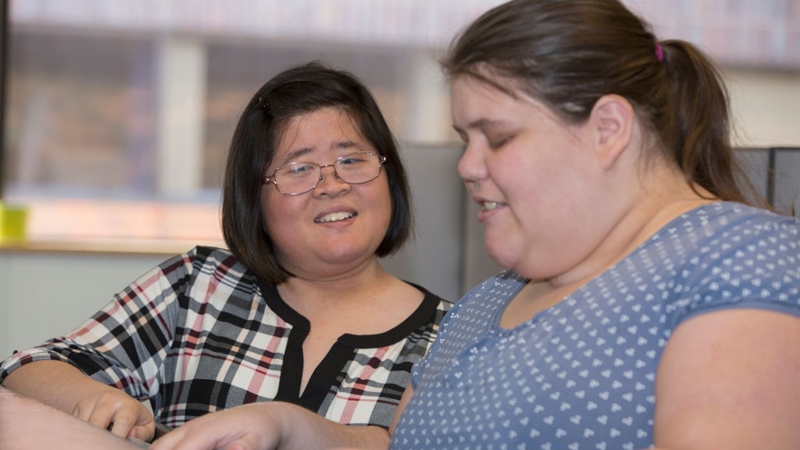Working with Child Welfare Workers (Plain-language version)
Download PDF | Original version

Introduction
Parents with disabilities are often mistreated when they have to deal with the child welfare office. Parents with disabilities are more likely to be reported to child welfare. They are more likely to have the government take their children away. Sometimes the child welfare office thinks that parents can’t take care of their children just because they have a disability.
Sometimes people who work for child welfare do not give parents with disabilities and their families enough help. Parents with disabilities are sometimes not allowed to adopt children or become foster parents.
In August 2015, the US Department of Health and Human Services and the US Department of Justice sent out a list of rules for child welfare offices. These rules say how child welfare offices and courts should treat parents with disabilities.
The ADA and Section 504
There are two important laws that help parents with disabilities with child welfare offices and courts. One is the Americans with Disabilities Act (ADA). The other is a part of the Rehabilitation Act called Section 504. These laws say that the government is not allowed to mistreat parents with disabilities. They are also not allowed to mistreat people with disabilities who want to become parents. The ADA and Section 504 also say that the government has to give support to parents with disabilities. Adoption agencies also have to follow these rules.
The ADA and Rehabilitation Act make sure that people with disabilities have rights. They also protect people who want help but are told “no” because they think the help is for a disability.
Individual treatment
The ADA and Section 504 say that child welfare offices and courts have to look at each family’s situation. They are not allowed to say that all parents with disabilities and their families need to be treated a certain way. They must understand that different parents and families have their own needs. For example, a child welfare office can’t take a child away from a parent with a disability just because they have a disability. Child welfare workers have to see how each parent will act. This is the same for foster care and adoption agencies. They are not allowed to tell people with disabilities they cannot take care of children just because they have a disability.
Equal rights
The ADA and Section 504 say that courts and child welfare agencies must let parents with disabilities use the same programs and services as parents without disabilities. This may mean that the courts and government agencies have to change some things to help these parents. For example, child welfare agencies and courts may need to bring in people who can use sign language so they can include Deaf or hard-of-hearing parents in their programs.
Reasonable modification (Making changes)
Courts and child welfare agencies have to make changes in how they do things to help parents with disabilities. They have to make changes unless it would change what the program is supposed to do. One of these changes could be teaching people with intellectual disabilities about raising children.
Child welfare agencies and courts also have to make sure parents with disabilities can talk to the people who work for them.
Here are some examples:
- Forms, letters and pamphlets that are easy to read
- Bringing in people who can use sign language (sign language interpreters)
- Forms, letters and pamphlets in Braille
Child welfare agencies and courts should talk to parents about what kind of help they need.
Child welfare agencies and courts are not allowed to make parents with disabilities pay them money to make changes.
Testing parents
Laws like the ADA and Section 504 say that child welfare agencies and courts have to treat parents with disabilities separately. They cannot say that all parents with disabilities will act the same way when raising children. When an agency or court tests a parent, they have to treat them as individuals. Agencies and courts may also have to make changes so that people can use the tests.
Services for parents with disabilities and people with disabilities who want to become parents
Child welfare agencies and courts may have to find help for parents with disabilities from people who do not work for the agency or court. For example, a parent may need mental health help from a different agency.
Filing Complaints
Parents with disabilities and people with disabilities who want to become parents can file complaints with the government. They can tell the government if they feel they have been mistreated because of their disability. People with disabilities can get help with complaints from family members, lawyers and other people who can help.
If you want to file a complaint with the Department of Justice, go to this website
www.ada.gov/filing_complaint.htm
To file a complaint with the Department of Health and Human Services, go to this website
